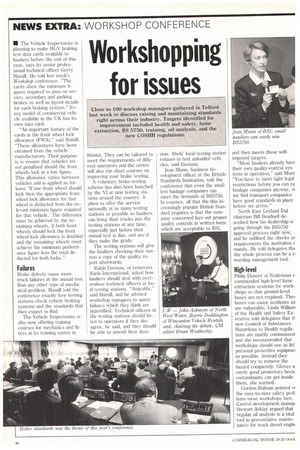Workshopping for issues
Page 44

If you've noticed an error in this article please click here to report it so we can fix it.
• The Vehicle Inspectorate is planning to make HGV braking test data cards available to hauliers before the end of this year, says its senior professional technical officer Gerry Hamill. He told last week's Workshop conference. "The cards show the minimum figures required to pass on service, secondary and parking brakes as well as layout details for each braking system," Every model of commercial vehicle available in the UK has its own data card.
"An important feature of the cards is the front wheel lock allowance (FWA)," said Hamill. "These allowances have been obtained from the vehicle manufacturers. Their purpose is to ensure that vehicles are not penalised should the front wheels lock at a low figure. This allowance varies between vehicles and is applied as follows: 'If one front wheel should lock then the appropriate front wheel lock allowance for that wheel is deducted from the relevant minimum figure required for that vehicle.' The difference must be achieved by the remaining wheels. If both front wheels should lock the front wheel lock allowance is doubled and the remaining wheels must achieve the minimum performance figure less the total deducted for both locks."
Brake defects cause more truck failures at the annual test than any other type of mechanical problem. Hamill told the conference exactly how testing stations check vehicle braking systems and the standards that they expect to find.
The Vehicle Inspectorate is also now offering training courses for mechanics and fitters at its training centre in Bristol. They can be tailored to meet the requirements of different operators and the centre will also run short courses on improving your brake testing.
A voluntary brake-testing scheme has also been launched by the VI at nine testing stations around the country. It plans to offer the service nationally at as many testing stations as possible so hauliers can bring their trucks into the testing stations at any time, especially just before their annual test is due, and see if they make the grade.
The testing stations will give the hauliers checking their system a copy of the quality report afterwards.
Ralph Davison, of removers AbeIs International, asked how hauliers should deal with overzealous technical officers at local testing stations. "Amicably," said Hamill, and he advised workshop managers to query failures which they think are unjustified. Technical officers at the testing stations should listen to operators if they disagree. he said, and they should be able to amend their deci sion. Abels' local testing station refuses to test unloaded vehicles, said Davison.
Jean Munn, business development officer at the British Standards Institution, told the conference that even the smallest haulage companies can meet the demands of BS5750. In essence, all that the this increasingly popular British Standard requires is that the company concerned lays out proper quality controls in written form which are acceptable to BSI, and then meets these selfimposed targets.
"Most hauliers already have their own quality-control systems in operation," said Munr "You have to meet tight legal restrictions before you Can ru: haulage companies anyway, s( we find transport companies have good standards in place before we arrive."
North East Leyland Daf chairman Bill Beadnell described how his dealership is going through the BS5750 approval process right now, and he outlined the checks an requirements the institution d mands. He told delegates tha the whole process can be a I': warding management tool.
High-level
Philip Dencer of Nederman commended high-level fume extraction systems for workshops so that ground-level hoses are not required. Thee hoses can cause accidents an are vulnerable. Linda William of the Health and Safety Executive told delegates that new Control of Substances Hazardous to Health regulations are mainly commonsen: and she recommended that workshops should use as litt: personal protective equipmei as possible. Instead they should try to remove the hazard completely. Gloves a: rarely good protectors becat contaminants can get inside them, she warned.
Gordon Bulman pointed a the easy-to-miss safety prob lems most workshops face, Castrol development managi Stewart Arklay argued that regular oil analysis is a vital tool in preventative maintenance for truck diesel engin,






























































































































































